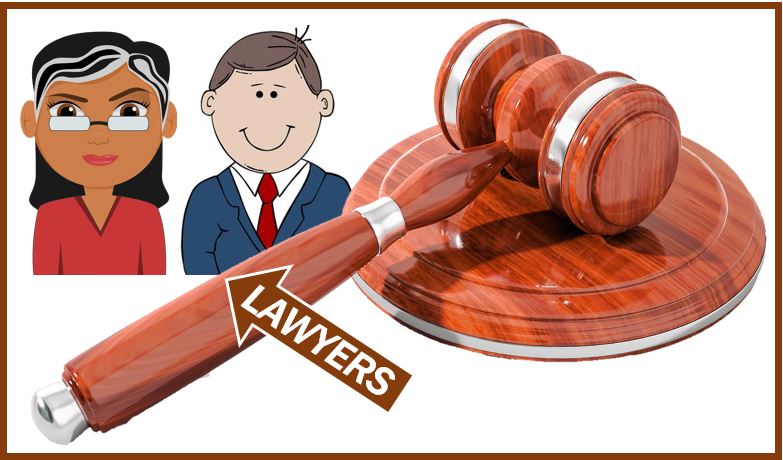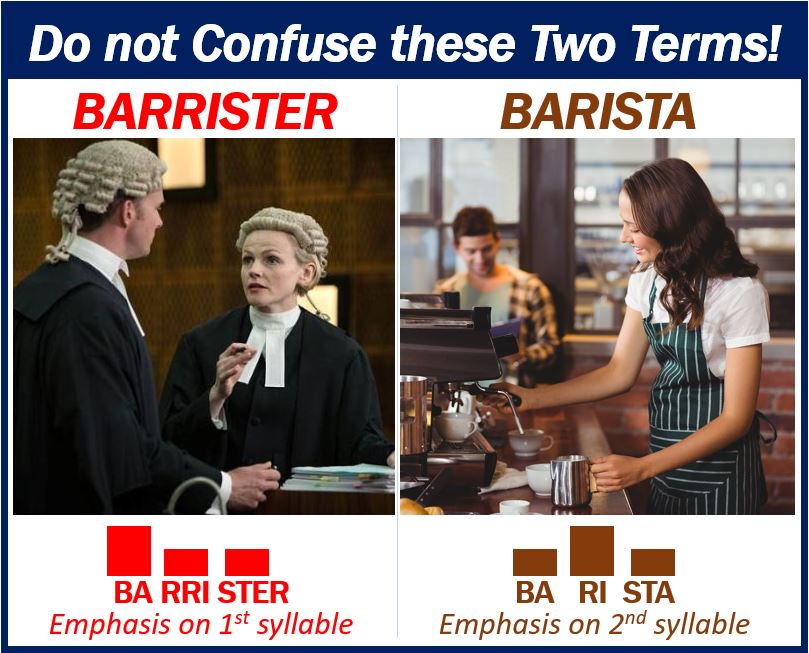A lawyer is somebody who is licensed to practice law. In the US, they are referred to as attorneys, while in the UK, people call them solicitors and barristers.
 A lawyer has two obligations:
A lawyer has two obligations:
- To protect their client’s rights.
- To uphold the law.
There are many different types of lawyers. Their duties may include:
- Prosecuting in court.
- Defending in court.
- Contracts.
- Real estate transactions.
- Gathering evidence or data.
- Preparing legal documents.
- Research.
- Providing legal counsel and advice.
According to the Law Dictionary, a lawyer is someone who is well-versed in the law—this includes attorneys, counsel, or solicitors. Essentially, it’s anyone who, for a fee or reward, represents clients in courts or other official judicial bodies, or provides legal advice on various matters.
 Etymology of lawyer
Etymology of lawyer
Etymology is the study of where words came from and also how their meanings evolved over time.
The surnames lauier, lawer, and lawere emerged in England in the fourteenth century, with the meaning “one versed in law, one whose profession suits in court or for client advice on legal rights.” The words came from the Middle English word Lawe, which meant “law.”
The Old English word Lahwita consisted of wita meaning “adviser, councillor, sage, wise man.”
Advocates and advisors
Advocates
In a civil or criminal trial, lawyers represent one of the parties, i.e., the defendant or plaintiff. They present evidence and argue on behalf of the client.
Advisors
They advise their clients regarding their obligations as well as their legal rights. They also suggest what the client should do, i.e., what courses of action to pursue, in both personal and business matters.
According to the US Bureau of Labor Statistics:
“All attorneys research the intent of laws and judicial decisions and apply the laws to the specific circumstances that their clients face.”
Legal secretaries, legal assistants, and paralegals do much of the work in law firms. They work under the supervision of qualified lawyers.
Associates, i.e., lawyers, carry out work for businesses, individuals, and other entities. Defense attorneys or criminal law attorneys represent the accused.
 A lawyer may specialize
A lawyer may specialize
Lawyers work in many different industries and fields. Let’s look at just a few of them:
Family law
They manage legal issues related to families and households, including child custody and adoptions. Divorce is also part of family law.
Tax law
A tax lawyer may have private individuals, companies, or both as clients. They help their clients find their way through the complicated labyrinth that exists in many countries’ tax systems.
Immigration law
They deal with such issues as green cards (USA), asylum or refugee status requests, visas, and citizenship.
Environmental law
These legal professionals typically work for or represent government agencies, waste disposal companies, or advocacy groups. Governments across the world have become stricter regarding greenhouse gas emissions and the disposal of plastics and other substances. Subsequently, demand for environmental lawyers has increased significantly.
Intellectual property law
They deal with inventions, copyright, trademarks, and patents. They also represent creators of music, books and other texts, and films (movies). Intellectual property refers to works, ideas, and other things that people have created or invented. If, for example, I publish a book and find out somebody is selling pirated copies of it, I will ask an intellectual property lawyer to help me stop them.
Employment law
A company or other employer that is having problems with a worker may seek the advice or representation of a professional who specializes in employment law. He or she may also represent the employee(s).
Securities law
These specialists represent stockbrokers, companies involved in M&A (mergers and acquisitions), IPOs, and anything else related to the purchasing and sale of securities. Securities, in this context, means stocks, bonds, and other financial instruments. The letters IPO stand for initial public offering, i.e., when a private company goes public.
Medical Malpractice Law
Surgeons, GPs, and other medical professionals seek the help of a medical malpractice specialist if they are being sued. A patient who wants to sue a doctor may also see this type of lawyer.
Corporate Law
Advises businesses on legal matters like incorporation, mergers, and compliance.
Criminal Law
Defends or prosecutes individuals accused of crimes.
Real Estate Law
Handles property transactions and disputes.
Personal Injury Law
Represents people injured by others’ negligence to secure compensation.
Bankruptcy Law
Assists with legal debt relief and financial reorganization for individuals or companies.
Entertainment Law
Handles legal aspects of the entertainment industry, including contracts and royalties.
Health Law
Deals with regulations and policies in healthcare, patient rights, and medical ethics.
Elder Law
Addresses legal needs of seniors, like estate planning and guardianship.
Maritime Law
Governs maritime issues, shipping, and ocean-related regulations.
Civil Rights Law
Protects individuals against infringement of rights and freedoms.
Solicitors vs. barristers
 Solicitors and barristers are terms people use in the UK and some Commonwealth nations, but not the United States. However, in the US, the Solicitor General is appointed to represent the Federal Government before the country’s Supreme Court.
Solicitors and barristers are terms people use in the UK and some Commonwealth nations, but not the United States. However, in the US, the Solicitor General is appointed to represent the Federal Government before the country’s Supreme Court.
In the UK, the basic difference between these two legal professionals is that barristers defend people in court while solicitors mainly work outside court. There are, however, some exceptions.
Solicitor
Solicitors may work for private individuals, businesses, charities, and other entities. They may specialize in property, employment, finance, family, crime, etc.
Theirs is mainly a desk job, although they may travel to visit clients and (infrequently) represent them in court.
Barrister
In court, you can tell barristers from solicitors immediately. The ones wearing a wig and gown are barristers, not solicitors.
According to Bright Knowledge, barristers receive case details from solicitors, allowing them time to review the evidence and prepare their court arguments, known as pleadings. Most barristers work independently and share Chambers with other barristers to reduce expenses like office space and administrative costs. However, some also work in-house as legal advisors for banks, corporations, or solicitor firms.
